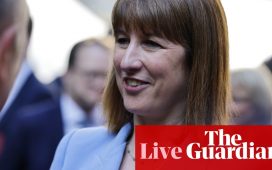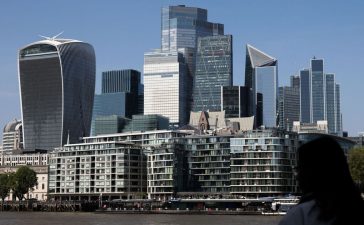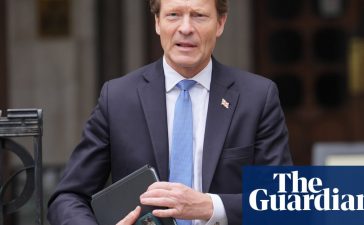UK inflation slowed faster than expected to 10.1% in January
Newsflash: UK inflation slowed to an annual rate of 10.1% in January, according to the Office for National Statistics’ consumer prices index.
That indicates prices across the economy did not rise as quickly as expected in January after a 10.5% reading in December. Economists had predicted a rate of 10.3%.
Key events
Filters BETA
Sizewell nuclear reactor taken off-grid for planned maintenance
Sizewell B in Suffolk – the last nuclear reactor to have been opened in the UK – went offline on Wednesday morning, according to National Grid data, for planned maintenance and refuelling.

The power plant is expected to be offline for 66 days, and extra workers have arrived at the site to help complete 10,000 routine maintenance tasks. About a third of the fuel set is also due to be replaced during this time.
Sizewell, owned by the French state energy giant EDF, supplies power to about 2.5m homes across East Anglia but energy will be sourced from other British power stations during the outage.
The company said work had begun earlier this week to chop down trees and clear land for the access road for the planned new nuclear reactor Sizewell C.
The outage comes as energy prices remain at the forefront of many consumers’ minds given this morning’s inflation figures.
The surge in energy prices sparked by the war in Ukraine, and one of the main contributors to stubbornly high inflation, has prompted fresh calls this morning from business groups for the government to invest in the UK’s energy system.
Some analysts say that boosting green investment could help insulate the UK from future volatility in global energy markets.
Barclays shares drop 8% after profits fall

The FTSE 100 has recovered somewhat from its earlier dip, and is almost flat for the day, but there is one big loser: Barclays (albeit not its top-earning employees).
The bank reported a drop in profits – not helped by a massive trading blunder – and also disappointed investors with a new share buyback. Shares are down by 8.5% in the first hour of trading on Monday morning.
The Guardian’s banking correspondent, Kalyeena Makortoff, reports:
Barclays staff will share £1.2bn in bonuses despite a 15% drop in the bank’s annual profits, having been hit by the costs of a US trading blunder and more money being put aside for a potential jump in defaults by borrowers.
The bank revealed in its annual report on Wednesday that its staff bonus pool would go relatively untouched, with its top performers to share £1.2bn between themselves for their work in 2022. That is down only 3% compared with last year. Including deferred bonuses, the pool was down 8% at £1.8bn.
It follows a near 15% drop in pre-tax profits to £7bn for the whole of 2022. That is compared with £8.2bn a year earlier, and is lower than analyst expectations of £7.2bn.
Joseph Dickerson, an equity analyst at Jefferies, an investment bank, said Barclays’ results were “weaker than expected” because of its corporate and investment bank, which deals with businesses.
And a £500m share buyback announced by the bank “is not good enough in our view” given its healthy capital ratio, he said. Dickerson had been expecting as much as £1bn, while other analysts were at an average of £675m.
We will not know the official data on wage growth until next month, but one thing is clear: the UK’s average living standards are likely to continue to decline for the next few months.
UK average weekly total pay grew by 5.9% year-on-year in three months ending in December, according to the Office for National Statistics. When adjusted for 10.5% inflation over the same time period, that means that British workers were able to buy nearly 5% less with their wages.
That means that political pressure is likely to remain on the government for months yet – particularly as many workers mount strike action for higher pay. Those include a wave of public-sector strikes.
Paul Nowak, general secretary of the Trades Union Congress (TUC), the UK’s leading union body, said:
With inflation still at more than 10%, working people are feeling the squeeze. Real wages fell faster last year than they have in decades – worse even that during the financial crisis.
That’s why working people are desperate for a government with a plan to get pay rising. But instead, we have a prime minister determined to hold down pay and refusing negotiate.
Whatever Sunak thinks his plan is, it has failed. The Tory pay squeeze has sucked the life out of our economy and left us on the brink of recession. We need a reset at the budget – a plan to get wages rising across the economy, and funding for public sector pay.
The Confederation of British Industry (CBI), the UK’s largest business lobby group, said “the tide is turning” on inflation, but warned of more to come.
Alpesh Paleja, the CBI’s lead economist, said:
Another fall in inflation over January suggests that the tide is turning on price pressures. But with inflation and pipeline cost pressures set to remain high this year, households and businesses are likely to feel the pain for a while yet. In particular, the continued strength in more domestic measures of inflation will keep alarm bells ringing at the Bank of England.
Given the central role played by energy prices in driving inflation up over the past year, the government must use the upcoming budget to deliver a homegrown, secure, low-cost and low-carbon energy system. Measures that boost green investment will not only help reduce exposure to volatility in global energy prices, but also deliver a sustainable path to reaching net zero.

Richard Partington
UK inflation fell for a third consecutive month in January, although in double digits it remained at among the highest levels in 40 years amid the cost of living crisis.
The latest prices data comes as the Bank of England considers a further rise in interest rates to tackle inflation at the highest levels since the early 1980s, in a move adding to pressure on borrowers after 10 successive rate rises in the past 18 months.
Rishi Sunak has also promised to halve the annual inflation rate this year as the cornerstone of his economic plans. Most economists expect inflation to fall back over the coming months amid a drop in global energy prices, and as the initial surge in markets after Russia’s invasion of Ukraine drops out of the annual inflation rate.
The chancellor, Jeremy Hunt, said:
While any fall in inflation is welcome, the fight is far from over. High inflation strangles growth and causes pain for families and businesses – that’s why we must stick to the plan to halve inflation this year, reduce debt and grow the economy.
You can read the full article from the Guardian’s economics correspondent, Richard Partington, here:
Analysts have had some time to digest the 10.1% inflation reading.
David Bharier, the British Chambers of Commerce head of research, said the 10.1% annual rate was still “a very slow move out of the peak”.
Household electricity and gas costs remain by far the biggest drivers, while transport costs saw a further easing. Producer price inflation, however, remains much higher at 14.1%.
The stubbornly high rate means that we are now seeing a compounding effect on what was already a spiking inflation rate this time last year. The peak may have started to pass but prices have settled at a much higher level than two years ago.
Simon French, chief economist at Panmure Gordon, an investment bank, said it was “encouraging” – and he suggested that real incomes (i.e., adjusted for inflation) might rise sooner than expected:
An encouraging UK inflation report. There were just signs in the November & December reports that UK was at risk of becoming an outlier. Less compelling in today’s report. Core inflation pressures easing to +5.8% YoY (+6.3% prev.) probably the most pleasing data point. pic.twitter.com/SHr4vYlgIa
— Simon French (@shjfrench) February 15, 2023
With almost all the leading indicators (shipping rates, monetary aggregates, gas prices, producer prices) signalling further declines to come then reasonable to see real income growth returning for UK households rather earlier than feared in the Autumn.
— Simon French (@shjfrench) February 15, 2023
Samuel Tombs, chief UK economist at Pantheon Macroeconomics, a consultancy, said the Bank of England may keep interest rates flat at 4% at the next meeting of its rate-setting monetary policy committee (MPC) in March – in order to make sure it does not stifle growth just as the economy is struggling.
January’s data aren’t the final word – February’s data will be published on 22 March, on the day of the monetary policy committee’s vote and one day before its decision is announced-but they should greatly strengthen the MPC’s faith in its forecasts for CPI inflation to fall rapidly back to the 2% target over the next 18 months.
Stock markets around Europe have mostly fallen in the opening mintues of trading, following Asian markets lower.
The FTSE 100 is down 0.2%, with banks the biggest fallers. Commodities companies – including Glencore even as it basks in record profits – dipped in tandem with oil and gold.
Here are the opening snap summaries from across Europe’s biggest markets, via Reuters:
-
EUROPE’S STOXX 600 DOWN 0.2%
-
FRANCE’S CAC 40 DOWN 0.1%, SPAIN’S IBEX UP 0.2%
-
EURO STOXX INDEX DOWN 0.1%; EURO ZONE BLUE CHIPS DOWN 0.1%
-
GERMANY’S DAX UP 0.1%
Glencore profits triple as it benefits from higher oil and coal prices

If you want to know where some of that money for higher energy prices has gone, here is a handy reminder: commodities company Glencore has reported record annual profits, helped by high oil prices and record coal prices.
The company will reward its shareholders with $7.1bn (£5.8bn) in dividends and share buybacks, it said.
Net profits more than tripled from $5bn in 2021 to $17.3bn in 2022, the FTSE 100 company reported on Wednesday. Its revenues rose 26% – or more than $50bn – to $256bn.
Oil trading profits were a big source of its profits, and its sales of coal benefited from record high prices.
Glencore’s chief executive, Gary Nagle, is pretty clear in what has driven the record profits for the company. He said:
The global pandemic, recovery from it and years of underinvestment, followed by conflict in Europe, exposed pre-existing vulnerabilities in energy security and supply chains, underpinning the generally high and volatile 2022 commodity price environment, which enabled the group to generate record profitability for the year.
And Glencore also noted that its shareholders are on board with its strategy – despite the huge impact that its products have in carbon emissions and other pollutants. It said:
A limited number of shareholders looked for opportunities to accelerate our current total emissions reduction pathway (50% reduction by 2035), while some raised the prospects for incremental growth in our coal production. However, the overwhelming majority of shareholders reiterated their support for our current responsibly managed coal decline strategy and associated targets.
Here is the inflation summary for the last decade: fairly steady around the Bank of England’s 2% annual target, and then lift-off in 2021.
The soaring price pressures were caused by supply chain disruption from the coronavirus pandemic lockdowns, and worsened by the energy crisis caused by Russia’s invasion of Ukraine which helped inflation increase further from February 2022.

Sterling has dipped further following the lower-than-expected inflation reading.
The pound is now down by 0.6% for the day at about $1.2102 against the US dollar.
Lower inflation might suggest that the doves at the Bank of England could hold sway, and interest rates may not have to rise as far as expected by markets. That in turn makes the pound less attractive to foreign investors.
The Bank’s chief economist, Huw Pill, has already indicated that monetary policymakers are concerned about increasing rates too much – a move that would choke off inflation but could also slow already meagre economic growth (or rather, stasis, in the case of the last quarter). Earlier this month he said:
It is important we do enough to attain our objective to return inflation to within the 2% target. But of course it is also important that we guard against the possibility of doing too much. We need to keep that zen-like balance in our objective.
The inflation data show a pretty marked fall in inflation during January: the headline measure, CPI, fell by 0.6% in January, compared with a fall of 0.1% in January 2022.
The biggest contributor to the decline was transport (particularly passenger transport and motor fuels), and restaurants and hotels, the Office for National Statistics (ONS) said.
Fuel prices have, of course, been one of the most notable inflationary pressures over the past year – along with anything energy-related – after Russia’s invasion of Ukraine roiled energy markets. Energy prices have eased somewhat, helped by a warm winter in Europe, meaning inflation was always likely to fall back.
But that was partially offset by rising prices in alcoholic beverages and tobacco, the ONS said.
UK inflation slowed faster than expected to 10.1% in January
Newsflash: UK inflation slowed to an annual rate of 10.1% in January, according to the Office for National Statistics’ consumer prices index.
That indicates prices across the economy did not rise as quickly as expected in January after a 10.5% reading in December. Economists had predicted a rate of 10.3%.
Ahead of the UK inflation data, a quick look at where we stand on financial markets.
Sterling is down 0.25% against the US dollar in early trading, at about $1.2140.
FTSE 100 futures suggest London’s blue-chip shares will dip by about 0.2% on opening.
Asian stock market indices in China and Hong Kong fell. Reuters explained:
Asian stocks slipped while the US dollar held firm on Wednesday following US inflation data and remarks from central bank officials that have investors worrying interest rates are going to be higher for longer.
Inflation expected to slow in January – poll of economists
Good morning, and welcome to our live, rolling coverage of business, economics and financial markets.
Rising energy prices, food prices, broadband prices – the UK economy has been under pressure from inflation since the start of 2021. Today we will find out if those pressures have eased, with the Office for National Statistics due to publish the latest inflation data shortly.
Economists polled by Refinitiv expect the annual rate of the consumer prices index of inflation to drop to 10.3%, down from 10.5% in December. Inflation peaked at a 41-year high of 11.1% in October.
The price pressure was prompted, at least in part, by disruption to global supply chains caused by the coronavirus pandemic lockdowns (and whiplash in the subsequent recovery). Russia’s invasion of Ukraine almost a year ago stoked the fires further by pushing up global energy prices.

Yet now economists believe the UK may have turned a corner, and are preparing for price growth to slow over the course of the year.
Sanjay Raja, a senior economist at Deutsche Bank, said he expects consumer prices index inflation to start a long march from the double digits to about 4% by the final quarter of this year. In a note to clients, he wrote:
After a second consecutive drop in annual inflation to end 2022, we expect headline inflation to continue its slow descent to start 2023. If our inflation projections are broadly on the mark, CPI inflation will register its first monthly drop in 12 months.
Easing inflationary pressures due to falling energy prices. Looking ahead, we continue to see inflation slowing down more acutely from H2-23. Falling expected energy prices, easing core goods inflation, and lower food prices over the course of the year will continue to drag on price momentum.
Yet even if price increases slow, UK households are still expected to have a tough time this year.
Edward Allenby, a UK economist at Oxford Economics, a consultancy, said he expects real income (adjusting for inflation) to fall by 1.2% in 2023. Inflation, rising mortgage costs as interest rates rise, and a slight tightening of government spending will all contribute to that drop in living standards, he said.
UK consumers endured a torrid year in 2022, as very high inflation weighed on spending power. We estimate that real household disposable income fell by 1.7% over the calendar year, which would be the biggest year decline since 2011. This year will be another challenging one for household finances as inflation is set to remain high, fiscal policy is being tightened, and mortgage costs will rise.
So the chances of avoiding a large fall in consumer spending are likely to rest on consumers saving less or borrowing more than they currently do – neither of which they have shown any inclination to do so far.
Much more detail to come after 7am GMT.
The agenda
-
10am GMT: Eurozone industrial production (December; previous: 2% year-on-year; consensus: -0.7%)
-
1:30pm GMT: US retail sales (January; prev.: -1.1% month-on-month; cons.: 1.8%)
-
2pm GMT: Christine Lagarde, president of the European Central Bank, at European parliament







